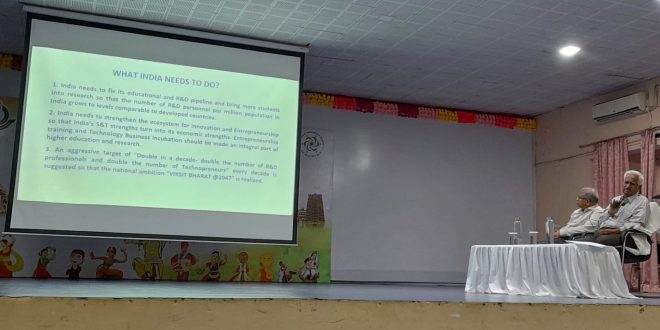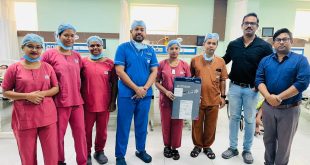Bhubaneswar: Indian Institute of Technology (IIT) Bhubaneswar, as part of Amrit Kaal Vimarsh-Vikasit Bharat @2047, has organized a seminar titled ‘How long is the long path for a developed India’ on 17th November 2023. Padma Bhushan Prof. V.S. Ramamurthy graced the occasion as Chief Guest and enlightened the audience on the subject.
An Indian nuclear physicist with a broad range of contributions from basic research to Science and Engineering administration, Prof. Ramamurthy is currently positioned as an Emeritus Professor at National Institute of Advanced Studies, Bengaluru. In his talk, he said that India, coming out of centuries of colonial rule seventy-five years ago, opted not only for a democratic form of governance but also for Science and Technology for development. While India has been able to build considerable Science and Technology strengths during these decades and address many of its national challenges, the economy of the country continues to remain that of a developing economy even after seventy-five years. Expressing his opinion on whether under these circumstances, is the target for India to become a developed nation by 2047 realistic or not, he argued that critical interventions have been made and planned during the last decade in higher education, research and technology driven entrepreneurship are bringing-in qualitative and quantitative changes that are bound to make this national dream realistic. Citing the examples of some of the developed countries, he suggested that there is a need for the country now to formulate decisive action plan to bring in more and more talented people to the field of R&D in the fields of science and technology and who will in turn, become technopreneurs to realize the dream of a developed India.
In his address, Prof. Shreepad Karmalkar, Director, IIT Bhubaneswar said that the higher education institutions have played an important role in the development process of the country, which is redefining both the education system and its contribution towards the significant growth of R&D. He opined that in the Amrit Kaal, the Higher Education Institutions have entrusted with a larger goal of outreach and engagement with the stakeholders, thereby creating a platform for awareness and acknowledgement of the initiatives taken up by the Government towards making a developed India by the year 2047. He also informed that IIT Bhubaneswar is actively participating in this process to implement various programmes designed by the Govt. of India in nation-building. in promoting the efforts being made towards making India a developed country. Further, he highlighted some of the initiatives of IIT Bhubaneswar including the launch of 4-year B.Sc.-B.Ed. Integrated Teacher Education Programme (ITEP), Teacher Portfolio and steps being taken up towards the launch of a course ‘Introduction to Research and Innovation’. He affirmed the need for growth of entrepreneurship in the fields of science and technology and IIT Bhubaneswar is taking various steps to encourage the students towards entrepreneurship and contribute to the economic development of India.
At the outset, Prof. P.V. Satyam of IIT Bhubaneswar introduced the Chief Guest. Among others, Director of Tata Institute of Fundamental Research (TIFR), Director of National Institute of Science Education and Research, Bhubaneswar (NISER), Director and Registrar of Institute of Physics Bhubaneswar, Shri Bamadev Acharya, Registrar, IIT Bhubaneswar, senior members of faculty and students across all programmes of the Institute were present on the occasion. Dr. Vijayakrishna Kari, Professor-in-Charge (Seminar), IIT Bhubaneswar, coordinated the programme.
 Update Odisha-Latest Odisha News I Breaking News Get latest news on Odisha, Govt. Jobs, OSSC, OPSC, Entertainment, Crime, Sports, and Education
Update Odisha-Latest Odisha News I Breaking News Get latest news on Odisha, Govt. Jobs, OSSC, OPSC, Entertainment, Crime, Sports, and Education



